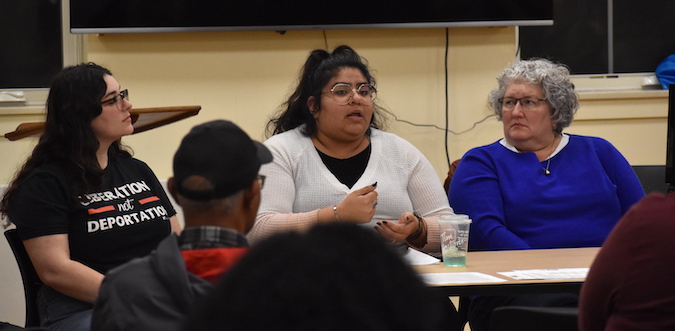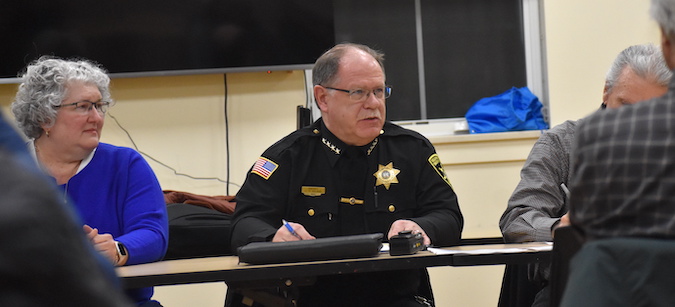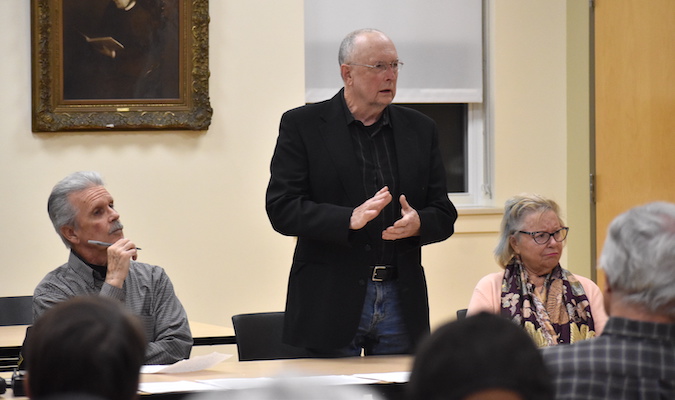Panelists say Orleans County has long benefitted from work of immigrants
ALBION – Orleans County for about two centuries has benefited from the fruits of immigrants’ labor, from the construction and expansion of the Erie Canal, to the sandstone quarries to agriculture, the county has long needed the strong backs and determination from foreign workers.
Bill Lattin, the retired Orleans County historian, shared those sentiments during a forum last week about immigration, a two-hour discussion at Hoag Library. The event was organized by the Community Coalition for Justice and featured several panelists.
Lattin said there have been three big waves of immigration into Orleans County. First it was the Irish fleeing starvation from a potato famine. That resulted in many Irish immigrants coming to Orleans County to work on widening the Erie Canal from 1838 to the 1850s, Lattin said.
Workers were needed to expand the canal and the main tools were a pick, shovel and a wheelbarrow.
“They were doing work the established people didn’t want to do,” Lattin said.
The Medina Sandstone industry took off in the mid-19th century. Local quarry operators welcomed Polish immigrants in the 1880s and ’90s, and then Italians in the late 19th century and early 20th century.
“It was dirty work and no one else wanted to do it,” he said. “The stone quarries were dangerous places to work. There were explosions and dust, which caused medical problems.”
More recently, foreign workers come to Orleans County primarily to work in agriculture.
“Historically, immigration has been a great benefit to the overall mechanisms of Orleans County,” Lattin said. “I think it’s something we can be proud of.”

Wendy Oakes Wilson
The farmworkers now increasingly are here through the federal H-2A program which allows farmers to bring in legal workers who stay temporarily.
Wendy Oakes Wilson, general manager of LynOaken Farms in Lyndonville and president of Leonard Oakes Estate Winery in Medina, said many local farms used to be able to hire a domestic workforce, with many temporary workers coming up for a few months from the south from states such as Florida.
But those workers are pretty much nonexistent these days for the local farms. LynOaken hires 38 workers from Jamaica who are paid a minimum of $16.95 per hour. LynOaken pays for their travel to get to Lyndonville and back home, and provides them with housing. With piece rate, the workers can make as much as $25 per hour, Wilson said.
Those workers are integral to LynOaken Farms and the winery’s success, Wilson said.
“Without them we would have to close up shop,” she said.
The workers pick apples, which are heavy in the bags carried by the workers. The pickers need to show great care to not pull the stems from the apple when picking them off the trees, or too squeeze them too hard and cause bruising.
“This is skilled labor and it’s a good portion of the economy in Orleans County,” Wilson said.

Leonel Rosario
Leonel Rosario started working at local apple farms when he was barely a teen-ager in the mid-’90s. He used to travel with his family to work in Florida, South Carolina and in New York.
They would pick apples, cut cabbage, plant vegetables and work in construction.
“We were happy to have a job,” Rosario said at the immigration discussion. “We were happy to go back home (to Mexico) and bring something.”
Rosario, his brothers and family members now own a grocery store, two restaurants, and several other businesses. Two of his brothers have their own farm. Other family have a tree-grafting business helping local farms who used to bring in people from Washington state for the service. The Rosario family also has a construction business locally.
Leonel Rosario said the Rosarios altogether employ about 120 people. They could use more employees.
He acknowledged it’s hard to find enough staff.
“We’re always looking for people to work,” he said.
Rosario said he is thankful for the local farmers who gave his family an opportunity. He worked many years for the Lamont Fruit Farm.
“Without the farmers there wouldn’t be any farmworkers coming here,” Rosario said. “All of the farmers have been great to work for.”

Cassandra Bocanegra, center, is the manager of Organizing and Strategy in the Finger Lakes for the New York Immigration Coalition. Mary Rutigliano, left, is a member of the Rochester Rapid Response Network that tries to support immigrants facing detention or deportation. Wendy Wilson is one of the leaders of LynOaken Farms in Lyndonville and the Leonard Oakes Estate Winery in Medina.
Two advocates for immigrants spoke as panelists during the forum last Thursday. Cassandra Bocanegra is the manager of Organizing and Strategy in the Finger Lakes for the New York Immigration Coalition. Mary Rutigliano is a member of the Rochester Rapid Response Network that tries to support immigrants facing detention or deportation.
Bocanegra said Orleans County has been a high enforcement area, partly due to the 500-bed immigration detention facility in Batavia. Many local law enforcement will call ICE (Immigration and Customs Enforcement) for routine traffic infractions due to a language issue, and those stops can lead to immigration or deportation proceedings for the immigrants, she said.
She said immigrants have revitalized the cities of Buffalo and Rochester, and they tend to open businesses providing jobs at a higher rate than native-born American citizens.
Bocanegra said NAFTA decimated the agriculture economy in Mexico and Latin American, causing an exodus of desperate people looking to come to the United States.
The U.S., however, has failed to update its immigration laws to reflect the reality near the border, and the need for workers in the United States, she said.
She bristled when someone in the crowd said he supports legal immigration, but doesn’t want “illegals” coming across the border.
“I don’t like the term ‘illegal,” Bocanegra said.
She said “undocumented” better reflects the humanity of people coming into the country without the proper documents. She faulted the U.S. for not providing more legal opportunities for immigrants to be in the country with permission.
“Everyone deserves to be treated with respect and the basic human dignity we all deserve,” she said.
Rutigliano said the Rapid Response Network tries to assist immigrants with language access, transportation, bullying in schools and other challenges locally.
Immigrants are good for Orleans County but is Orleans County good for immigrants?” she said.
The Rapid Response Network was formed in 2017 due to the heightened immigration enforcement in the local rural counties.
“What can we do to make the whole GLOW region safer for immigrants?” Rutigliano said.

Orleans County Sheriff Chris Bourke said there are far fewer issues with migrant workers these days from a law enforcement perspective. He said many of the farmers have buses and vans to transport workers to the store, bank and for other needs. That has drastically reduced the number of farmworkers driving without licenses, he said. Wendy Wilson, left, is LynOaken Farms general manager and Leonard Oakes Estate Winery president.
Orleans County Sheriff Chris Bourke, an employee of the Sheriff’s Office for 39 years, said farmworkers and immigrants seldom cause problems these days.
“We do not see immigrants causing a disproportionate number of problems,” he said.
But the farmworkers in the 1980s and ’90s used to buy cheap cars and put license plates on them, operating without insurance and without driver’s licenses.
Now, many of the farms have buses and vans and take their workers to the grocery store, bank and other locations.
Bourke said the housing is much better now, too. He recalled when 20 to 30 workers were crammed into trailers.
“I see a much more organized system, a cleaner system,” he said. “We don’t see the traffic stops and problems like we did.”
Bourke said he has a deep respect for the farmworkers, who put in long hours often in extreme weather – cold, rain or intense heat.
“The people in the field are working people, they’re God-fearing people, they’re family people,” he said.
Bourke said the local law enforcement agencies are facing a worker challenge right now. The deputy sheriff exam used to get about 60 to 90 people, but now only gets 20, and half of those can’t pass the physical fitness requirements.
“Law enforcement are good-paying jobs with benefits and healthcare,” Bourke said. “But no one wants these jobs either. We’re trying to get more people to take the test.”
The sheriff said he would welcome more Spanish-speaking staff members, include among the deputies.






































































